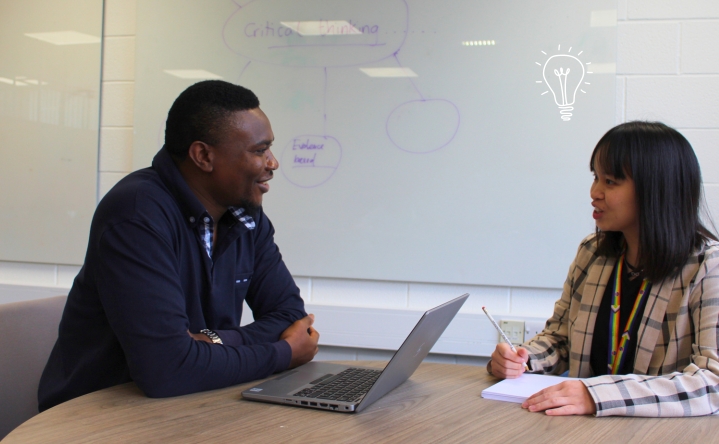Coursework and non-exam assessments (otherwise known as NEAs) are part of some A-Level subjects. For example, in A-Level Geography students may be expected to complete a fieldwork investigation, or English Literature students may be asked to carry out an independent critical study.
It’s a great taste of what it’s like to complete longer written assignments at University, but it can be challenging. No matter what subject, if your students are completing a piece of extended writing as part of their studies, we have resources to support them in preparing for writing longer essays and expressing themselves clearly and confidently.

Using our resources
Ideas and inspiration for how you might use our resources with students who are completing coursework and NEAs, both for whole-class delivery and to set as independent work.
Our Time management resources encourage students to manage their time effectively, including:
Our Study timetable allows students to customise their own study timetable each week based on their A-Level subjects, and features built-in prompts reminding them to take a break between study sessions.
Our Time management strategies resource provides effective time management strategies for students to choose from.
Our Work-life balance scale is a tool that supports students in optimising their work-life balance.
Our Procrastination quiz provides students with strategies to help them avoid procrastination.
Planning
Our Essay planner allows students to input their deadline for a piece of written work and provides approximate guidelines on how long to spend on each stage of their planning, research and writing.
The stages of writing an essay is an interactive that invites students to reorder the stages of writing an essay and consider how long they should approximately spend on each.
Finding resources
Our Research skills resources provide your students with guidance on how to find free resources, including:
- Books in a library
- Google Scholar
- Open Access
- JSTOR
- CORE
- Statistics
Our introduction to the Dewey Decimal System explains how to find books in a Library and our game tests their knowledge, prompting students to reorder books in the correct order against the clock (which can promote healthy competition during whole-class delivery!).
Evaluating resources
Types of resources is an interactive providing students with an overview of different types of resources and examples of how they might be useful in their studies, allowing them to make more informed decisions when searching.
Our Resource evaluation checklist can be used by your students as they are searching for resources. It encourages them to critically evaluate each resource they find by asking themselves the six questions before deciding whether to use it in their work.
Choosing appropriate resources is an interactive quiz prompting students to consider how useful different resources might be in answering a series of academic questions.
Our Drag and drop interactive encourages students to weigh up the strengths and weaknesses of different resources.
The list of Pros and cons at the end of the page demonstrates some of the pros and cons of different types of resources.
Reading resources
Our Reading skills resources can support your students with getting the most out of their reading, from identifying useful features and reading more effectively, to establishing their reading purpose and taking useful notes from their reading.
Features of a Text introduces students to the different features of a text and explains how they might be useful in their studies, from abstracts and glossaries to URLs and indexes.
Reading with a purpose is a concise video explaining how students can read with a clear purpose.
Our Reading effectively interactive introduces students to effective reading strategies.
Our Note-taking strategies interactive provides students with a variety of effective notetaking strategies that they can adapt and use in their studies.
Making the most of your notes is a short animation guiding students through effective ways of using the notes they make.
Getting started
Our essay decision tree supports students who are about to write their first essay and may be unsure about what to do next.
Building your argument
Our series of videos cover building an argument from conception through to expressing it in a piece of work. Making arguments defines and explains the basics of arguments, Understanding how to build an argument uses the analogy of baking to explain how Bloom’s Taxonomy can help students develop their argument, and Forming your argument explains how to communicate an argument effectively to others.
Technical writing support
Our Writing skills resources cover the technical elements of writing, including using punctuation and academic conventions.
Our Punctuation page covers the basics of using punctuation in academic writing.
Features of academic writing explains the typical features of academic writing and provides an example of a paragraph in both academic and non-academic style.
Using evidence in your work reminds students of the importance of acknowledging sources clearly and provides examples of how to refer to evidence in a piece of work through paraphrasing and quoting.
Referencing
Our Referencing skills resources cover everything your students need to know about referencing resources accurately and consistently.
Our Referencing page includes a video covering the basics of referencing, an interactive helping students find information for their references, referencing FAQ videos and examples of Harvard referencing.
Our Plagiarism page contextualises plagiarism for students and includes an interactive quiz to test their knowledge.
Proofreading
Our Proofreading video provides practical tips for spotting errors in your work, and the accompanying interactive give students a chance to have a go at finding mistakes in a piece of writing.
Implementing feedback
Receiving feedback on your work is an interactive resource that shares advice on how to process receiving feedback, and the accompanying video encourages students to actively use their feedback using real examples of how current University students use feedback to improve their work.



